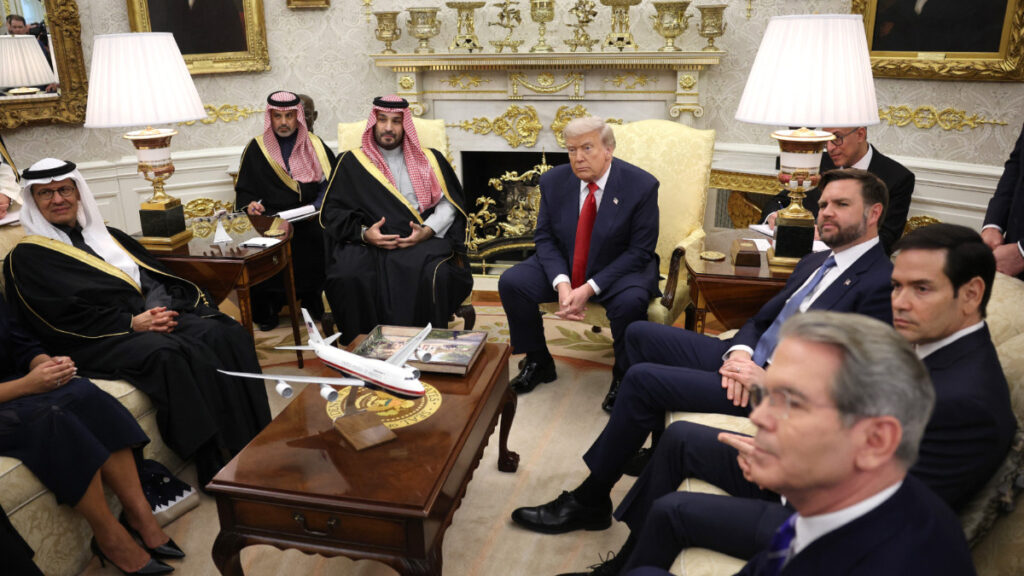A major defence partnership signed by the US and Saudi Arabia is expected to fast-track arms sales to the kingdom, of which the F-35 warplane is just one component, current and former US officials told Middle East Eye on Wednesday, speaking on condition of anonymity.
“The conversation has changed from ‘we will see’ to ‘yes, but how and when’,” one person familiar with the deal said.
The White House announced on Tuesday that US President Donald Trump and Crown Prince Mohammed bin Salman signed a new Strategic Defence Agreement (SDA).
The details are being hammered out by officials in the US government. A former senior US official familiar with the ongoing process confirmed to MEE that the agreement will put Saudi Arabia far ahead of other Gulf states and US partners in terms of wait times and negotiations for sophisticated US weapons.
“The Saudis have received Trump’s go-ahead to get the best in defence technology,” the former official said.
New MEE newsletter: Jerusalem Dispatch
Sign up to get the latest insights and analysis on
Israel-Palestine, alongside Turkey Unpacked and other MEE newsletters
Notably, the agreement appears to confirm Trump’s pledge from Tuesday to sell Saudi Arabia the “top of the line” F-35 warplanes, despite Israeli lobbying to ensure the kingdom receives planes of a “reduced calibre”.
The F-35 is just one item on Saudi Arabia’s shopping list. Deliveries of the F-35 could still take years, so the kingdom is looking at more futuristic weapons systems, like Collaborative Combat Aircraft (CCA) drones.
CCA are a special type of drone being designed by the US military to fly alongside manned aircraft like the F-35. They would be able to move ahead of warplanes and conduct jamming operations or launch projectiles.
Saudi Arabia is already in talks with the US’s Shield AI on acquiring small, nimble drones.
On Tuesday, David Alexander, the president of General Atomics, said his company was discussing selling up to 200 CCA drones in addition to traditional MQ-9B’s.
The defence agreement applies to military technology, and Saudi Arabia is expected to unveil separate deals pertaining to civilian nuclear technology and AI chips.
Non-Nato ally
The US designated Saudi Arabia a major-non Nato ally on Tuesday, a step that will speed up weapons transfers to the kingdom and deepen military training.
Saudi Arabia is playing catch-up with other Middle Eastern states that already have the designation. Bahrain, Qatar, and Kuwait are all major non-Nato allies, as are Morocco, Egypt, Jordan, and Israel.

US will sell F-35 warplanes to Saudi Arabia, Trump says
Read More »
Crown Prince Mohammed bin Salman has received a lavish welcome in Washington – his first visit to the US since 2018, when Middle East Eye and Washington Post columnist Jamal Khashoggi was murdered. The CIA said the crown prince ordered the killing.
The 40-year-old crown prince’s international standing has risen since. He has navigated Israel’s war on Gaza, rekindled relations with Iran and extricated Saudi Arabia from a brutal war on Yemen. He wants to deepen Riyadh’s economic and security partnership with Washington.
The designation of “major non-Nato ally” will help Saudi Arabia as it looks to acquire more US weapons systems, particularly given the slow production time for items like missile interceptors.
Bahrain was designated a major-non Nato ally more than two decades ago. Qatar’s designation came more recently, in 2022, when the Biden administration was leaning on Doha to supply liquified natural gas to Europe shortly before Russia invaded Ukraine.
Qatar also helped the US evacuate from Afghanistan.
‘Memory of Aramco attack’
While Gulf countries value the recognition, it falls far short of the type of binding commitment to their defence that many want.
MEE reported previously that the Trump administration greenlit an Israeli attack on Qatar in September, targeting Hamas negotiators. The decision discredited the decades-old foundation of the US’s status as the security guarantor of the oil-rich region. Qatar was a major non-Nato ally at the time.
But for Saudi Arabia, the US’s reliability on security started to fray as early as 2019 when Iran attacked its Aramco oil facilities. The first Trump administration refused to retaliate against Tehran or its allies, the Houthis, whom Saudi Arabia was fighting at the time.

‘I grab that hand’: Saudi crown prince showered with praise in rare meet the press
Read More »
Experts say Saudi Arabia, the world’s largest oil exporter and the Arab world’s only G-20 economy, wanted a much more binding defence commitment from Washington.
“The memory of September 2019…still looms large,” Hesham Alghannam, a Saudi defence analyst in Riyadh, said at an event hosted by the Arab Gulf States Institute in Washington, before the crown prince’s visit.
Saudi Arabia was eyeing the type of mutual defence treaty that the US has with its East Asian ally, Japan. However, that would require Senate ratification. Talks on a treaty were taking place in the context of Saudi Arabia recognising Israel.
“We want to be part of the Abraham Accords, but we want also to be sure that [we] secure a clear path [towards a] two-state solution,” the crown prince said at the Oval Office on Tuesday, referring to the 2020 normalisation agreements Trump brokered between Israel, the UAE, Morocco, and Bahrain.
Trump said that Saudi Arabia would be purchasing “top of the line” F-35 warplanes, in spite of what he said were Israeli demands to sell the Arab world’s only G-20 economy “planes of reduced calibre”.
The crown prince was feted at a White House black-tie dinner whose guest list included the CEO’s of Apple, Nvidia, Chevron and Bechtel.

